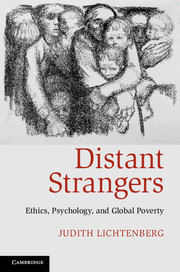Book contents
- Frontmatter
- Dedication
- Contents
- Preface
- Chapter 1 Introduction
- Chapter 2 Entanglements and the claims of mere humanity
- Chapter 3 Duties and rights, charity and justice
- Chapter 4 “Negative” and “positive” duties
- Chapter 5 Oughts and cans
- Chapter 6 Why people do what others do – and why that’s not so bad
- Chapter 7 Whose poor?/who’s poor?: deprivation within and across borders
- Chapter 8 Hopefully helping: the perils of giving
- Chapter 9 On motives and morality
- Chapter 10 Conclusion: morality for mere mortals
- Works cited
- Index
Chapter 4 - “Negative” and “positive” duties
Published online by Cambridge University Press: 05 June 2014
- Frontmatter
- Dedication
- Contents
- Preface
- Chapter 1 Introduction
- Chapter 2 Entanglements and the claims of mere humanity
- Chapter 3 Duties and rights, charity and justice
- Chapter 4 “Negative” and “positive” duties
- Chapter 5 Oughts and cans
- Chapter 6 Why people do what others do – and why that’s not so bad
- Chapter 7 Whose poor?/who’s poor?: deprivation within and across borders
- Chapter 8 Hopefully helping: the perils of giving
- Chapter 9 On motives and morality
- Chapter 10 Conclusion: morality for mere mortals
- Works cited
- Index
Summary
A reasonable morality cannot continually require us to make very large sacrifices to our own well-being. Both common sense (of which we have reason to be deeply suspicious, of course) and widely accepted philosophical approaches tell us that such requirements impermissibly infringe our autonomy and our ability to live our lives as our lives. This critique has commonly formed part of an attack on utilitarianism and consequentialism, but it exerts influence beyond moral theory. The view underlies the popular idea that duties to render aid to others are very limited. Much of its persuasive power lies in the supposed contrast with our “negative” duties not to harm people. Although we have at most imperfect duties to aid people, the argument goes, we have strict or perfect duties not to harm them. And one thing that gives this position its persuasive power is the suggestion that not harming people is for the most part straightforward and easy. Don’t kill people, don’t rape them, don’t attack them, don’t rob them: if you follow these simple and indisputable rules you are doing what you ought to do and cannot be faulted; at least you have fulfilled your obligations.
But over the last few decades something has changed. We see – or, in many cases, others inform us in no uncertain terms – that our most humdrum activities may harm people in myriad ways we have never thought about before. And because these activities are seamlessly woven into our normal routines, ceasing to engage in what we may call these “New Harms” is not at all easy – not simply a matter of refraining from things we never would have dreamed of doing in the first place, like killing and raping and robbing. Not harming people turns out to be difficult, and to require our undivided attention.
Information
- Type
- Chapter
- Information
- Distant StrangersEthics, Psychology, and Global Poverty, pp. 73 - 96Publisher: Cambridge University PressPrint publication year: 2013
